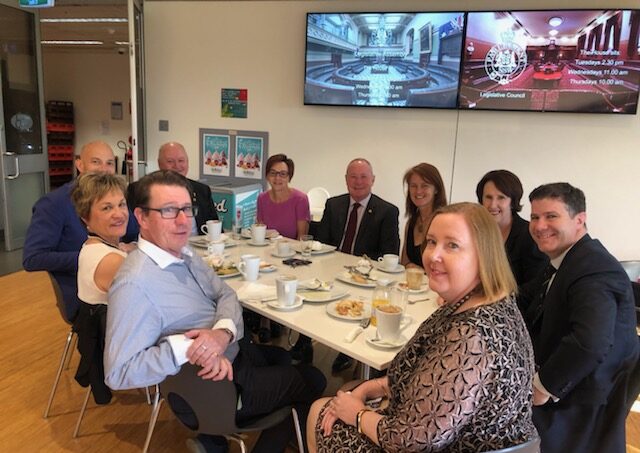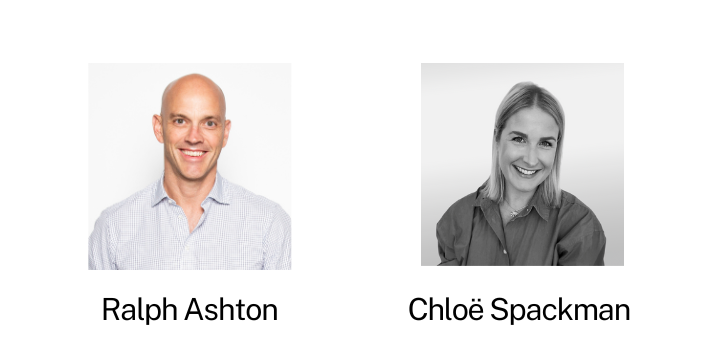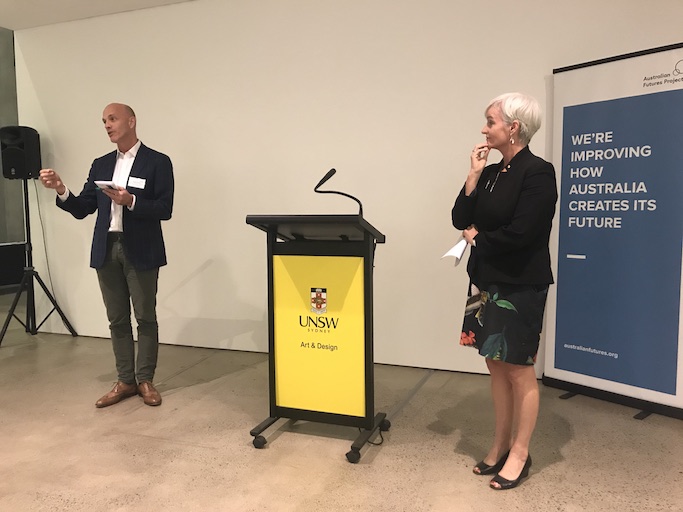
How does trust-based philanthropy work? It is a growing area of interest but requires a highly relational approach from funder and fundee, and strong sense of a shared mission. Here, Next25, a ‘think and do tank’, and one of its funders, SALT Catalyst, share how they’ve developed their relationship that helps support Next25’s high-level, long-term systems change work.
Answers provided by Ralph Ashton, Executive Director, and Chloë Spackman, Director of Programs and Engagement, at Next25, along with Elina and Andrew Wilson, at SALT Catalyst.

1. What is Next25 and what does it do?
Next25: Next25 is an independent, non-for-profit, “think-and-do tank”. Our mission is to create the future Australians want. By using rigorous research and trusted engagement, we uncover levers to shift deep contributing factors of Australia’s biggest challenges and address them with ground-breaking initiatives. Next25 works on sparking catalytic change at the systems level so the nation can thrive across economic, environmental and social dimensions.
2. Next25 has identified five root causes of Australia’s biggest issues. What’s an example of both your “think and do” outcomes?
Next 25: Through research projects, particularly Navigator and Recoded, we distilled the views of cultural and economic leaders, experts and the public, and identified the following major opportunities to improve Australia’s performance.
- Articulating a galvanising national identity
- Setting benchmarks beyond GDP
- Enabling constructive discussion
- Fostering engaged decision-making
- Restoring trust in government.

One of the “do” initiatives generated from that research is Next25 Leadership. This is a suite of courses, coaching, workshops and catalytic support exclusively for parliamentarians to reconnect to their values and harness their power. Around 8% of all sitting parliamentarians are alumni and 100% say it improved their ability to lead. Our initiatives are designed to make an impact while role-modelling the optimism of our approach. This is how we can achieve scale.
3. Why did Salt Catalyst invest in Next25 and how did the relationship come about?
SALT Catalyst: On return to Australia after many years overseas, our founders had a renewed perspective on the country – appreciating the huge, unique potential but also frustrated with our fumbling progress. When we learned about Next25, we were delighted that there was an organisation actually trying to figure this out and that they were doing it with authenticity and a strong intellectual and ambitious approach.
Next25 and SALT Catalyst have a deep alignment in our focus. Moving the dial in all of SALT Catalyst’s key themes – empathy, equity, education and environment – depends on systemic change beyond addressing only the symptoms. Next25’s foundational work complements our other thematic investments. We were also drawn to Next25’s approach of bringing all voices to the conversation – not pretending to know it all but acting as a catalyst for change. We also enjoy working alongside Next25, with their constant curiosity and deep thinking, combined with an ambitious, action-oriented attitude. We feel that the unifying, optimistic spirit Next25 brings to the national discourse is needed in our world now.
Next25: For us, trust-based relationships do not appear overnight! They develop over years, with donors often dipping their toes in the water with a smaller, single-year gift that grows in size and length over time. Sometimes the early donations are tied to a specific initiative. Twelve years after our founding, most of our donations are now 3-to-5-year, untied commitments. We believe we must earn our donors’ trust and the right to the flexibility that comes with unrestricted, multi-year funding. Key to this is showing impact. But it’s also being honest about the inherent risks in our work and upfront when we hit roadblocks or change course. It’s about being frugal, professional and efficient. And it rests on us being genuine in our engagement with donors – we want their ideas, insights and feedback. It’s about being in partnership with our donors, recognising we each have much to contribute to our shared mission.
4. You use a trust-based funding model. According to the Trust-Based Philanthropy website, the model rests on six principles: flexible funding, onus on funder to get to know the work, streamlined paperwork, funder responsiveness, acting on feedback and offering support beyond financial. Do these apply in your relationship?
SALT Catalyst: One of our key principles is to “fall in love with the problem, not the solution”. Along with Next25, we have a shared vision of Australia and all Australians flourishing. We fund Next25 to discover the strongest levers to get us there. As a funder, you need to appreciate and enjoy the unpredictable and dynamic nature of systemic change to do this – we feel that only with untied funding we’re able to let the team direct the funds into the areas of most need for biggest impact. We appreciate that sometimes you need to change tack. We trust Next25’s judgment in making course corrections and want to stay onboard, enjoying the journey with all the learnings it brings.
Next25: Many of our donors have supported us more than 10 years. They are deeply curious about the problem we’re addressing – and the way we’re addressing it. They share our value of humility. They know no one person can fully understand the system. So, we must be in constant “listen and learn” mode. Almost all our funding is mission-based (untied), multi-year and with simplified reporting. This enables us to plan ahead, build momentum over years, and focus on our mission. Our donors enjoy spending time understanding our dreams – and what’s in the way. They provide much more than money; they problem-solve with us, challenge us to dream even bigger, and encourage us to stay the course when times get tough. They connect us with other philanthropists, shortcutting the due diligence process.
5. What are the challenges of getting systems change work funded? Is a trust-based model the only way to fund such work?
Next25: Working to unlock systemic challenges will turbocharge progress on the symptomatic issues and causes that many funders want to support. What we offer is highly complementary to a lot of other dynamic organisations working on challenges Australia faces. The issue in attracting funding may be that this is not obvious at first glance. Systems change work requires patience, humility and authenticity. Consequently, the trust-based model is the most realistic way for Next25 to engage with funders and a critical way to enable us to build our capacity. Many of our funders have an entrepreneurial background or spirit, and that provides an exciting platform for curiosity, experimentation and insightful conversations and relationships. Next25 thinks of its funders as visionaries and the vanguard of Australian philanthropy.
6. Trust-based funding is highly relational. How do you connect with funders regarding progress and impact?
Next25: The best formal reporting is the type that holds us accountable and helps us learn without being onerous or formulaic. But we spend much more time on informal reporting. We provide donors with quick updates, especially on parts of our work or organisational development (capacity building) that we know they are interested in. We introduce our donors to our wider team so they get to know the people behind our research, initiatives, impact and governance structures. We ask for meetings not only to provide updates on plans and progress, but also to brainstorm ideas and challenges. We think of our backers as much more than donors; they’re also our brains trust, our coaches and our champions.
7. Why is it important to fund such deep-level systems change work?
SALT Catalyst: We need all kinds of philanthropy – from disaster relief to social change philanthropy. The latter makes us tick – we believe we’re getting most bang for our buck by digging out and addressing the root causes. It requires more patience and is less straight-forward, but also delightfully diverse and exciting. We invest separately into economic, social and environmental dimensions and it is great to have Next25 working across them all – almost like laying the best possible foundations for these investments to succeed. It is imperative to get the societal conditions right for sustainable change that is not dependent on the leader of the day or the stock market. We need all levers to be pulled to have a flourishing future.
Next25 is running two leadership courses in September for both state and federal parliamentarians.